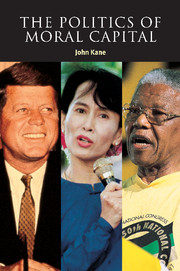Book contents
- Frontmatter
- Contents
- Acknowledgments
- Introduction
- Part I Moral capital
- Part II Moral capital in times of crisis
- 3 Abraham Lincoln: the long-purposed man
- 4 Charles De Gaulle: the man of storms
- Part III Moral capital and dissident politics
- Part IV Moral capital and the American presidency
- Epilogue
- Bibliography
- Index
3 - Abraham Lincoln: the long-purposed man
Published online by Cambridge University Press: 22 September 2009
- Frontmatter
- Contents
- Acknowledgments
- Introduction
- Part I Moral capital
- Part II Moral capital in times of crisis
- 3 Abraham Lincoln: the long-purposed man
- 4 Charles De Gaulle: the man of storms
- Part III Moral capital and dissident politics
- Part IV Moral capital and the American presidency
- Epilogue
- Bibliography
- Index
Summary
If I were to try to read, much less answer, all the attacks on me, this shop might as well be closed for any other business… If the end brings me out all right, what is said against me won't amount to anything. If the end brings me out wrong, 10 angels swearing I was right would make no difference.
LincolnFor the greater part of his presidency, Abraham Lincoln was widely regarded as a weak leader, a mere figurehead controlled by more powerful men in his cabinet. He was generally granted, except by the bitterest foes of Union, to be well intentioned and honest – a welcome change after a Democratic administration tainted by corruption – but much more was needed at a desperate hour. It seemed to observers that Lincoln lacked the caliber of a statesman, that he “did nothing – neither harm nor good.” Eventually there would be doubt whether he was an advance even on his despised predecessor, James Buchanan, whose failure of nerve in the political storm over Kansas in 1857–58 had practically guaranteed secession and war, causing him to be reviled in the North as a traitor. Twelve months into Lincoln's first term, a British journalist was predicting that when Mr. Lincoln left office “he will be no more regretted, though more respected, than Mr. Buchanan.”
- Type
- Chapter
- Information
- The Politics of Moral Capital , pp. 50 - 82Publisher: Cambridge University PressPrint publication year: 2001

